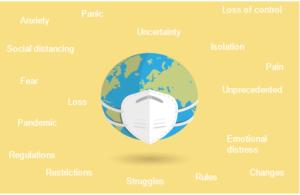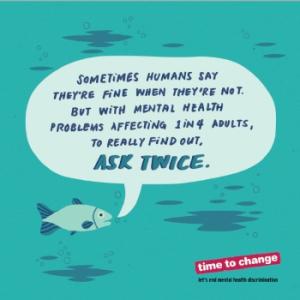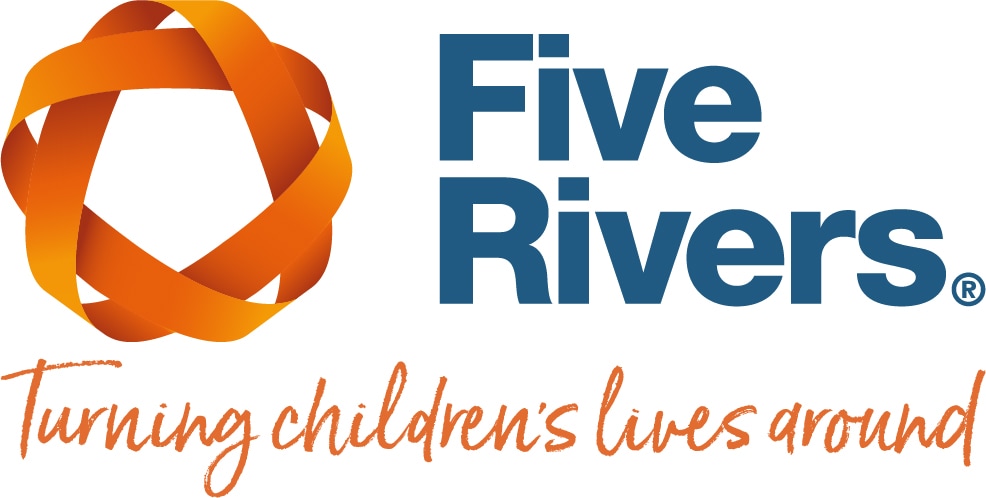World Mental Health Day 2020
World Mental Health Day
Saturday the 10th of October
‘Mental Health for all’
By Katharine Anderson and Hannah Gilding
Since 1992, World Mental Health Day has been globally recognised. Every year, a theme is selected which feels significant. This year, the theme is ‘Mental Health for all’.

A recap…
Mental health is not linear; it can fluctuate and change. We will all experience times during which we feel blue, frightened, stressed, or upset. Life is continually flowing and moving – circumstances arise, life events happen, and our reaction to what we are faced with will vary.
While there has been a shift in approach to mental health, with campaigns such as ‘it’s ok no to be ok’ raising awareness, there is still a great deal of stigma and discrimination that surrounds mental health. The understanding of the phrase mental health is confused; we all have mental health. To have a period of poor mental health does not always mean you have a mental health disorder.
Mental health and COVID-19
The global impact of COVID-19 has affected the emotional health of millions of people. We are collectively experiencing something we never envisaged would come to be in 2020. The pandemic was born into an already underfunded and underattended mental health landscape. One person in every four will be affected by a mental health difficulty in their lives, with around 450 million people living with mental health conditions worldwide (WHO’s World Health Report, 2001).
The United Nations (2020) has stated, “Good mental health is critical to the functioning of society at the best of times. It must be front and centre of every country’s response to and recovery from the COVID-19 pandemic” (UN, Policy Brief, 2020). On average, countries only spend 2% of their health budgets on mental health. There has been a move to invest; to provide support and access for everyone who needs it. Mental health is a human right, which, now more than ever, is essential to consider, support, and address.

“World Mental Health Day is an opportunity for the world to come together and begin redressing the historic neglect of mental health… We are already seeing the consequences of the COVID-19 pandemic on people’s mental well-being… Unless we make serious commitments to scale up investment in mental health right now, the health, social and economic consequences will be far-reaching” – Dr Tedros Adhanom Ghebreyesus, Director-General of the World Health Organisation.
So, what can we do?
‘Do one thing’
The charity Mind explored the impact of months of lockdown and loss, discovering out of 16,000 interviewed, more than half (60%) of adults and two thirds of young people (68%) reported experiencing deterioration in their mental health. Mind have coined their campaign ‘Do one thing’ for better mental health. Mind acknowledge that it can be incredibly challenging, especially in the current climate, to find positive energy, or the willing to make a change. That’s why they encourage doing one thing, whether it be going for a walk, doing something creative or reaching out to someone else – one thing to make a difference. They have even created a calendar, which can be used as a handy prompt. The calendar splits challenges into five categories:
- Do something different today and make a connection
- This week, why not get active?
- Take notice and be in the present
- Focus on learning
- Give
Mind have a wealth of resources available on their website, which are specifically related to coronavirus and the workplace. They can be found here.
Time to Change activities
The organisation Time to Change are asking this World Mental Health Day, how employers and employees can create learning opportunities for staff to increase their understanding of mental health. For example, by simply reading this circulated piece, you are taking a step in the right direction. Their pack of activities includes more information about stigma, remote working and mental health, how to check in with a colleague and even provides the opportunity for a mental health virtual pub quiz! Click here for access to further resources and here for campaigning at work resources. Time for Change also have a range of posters on their website which are eye catching and thought provoking – see below for an example.


‘Are you ok?’: Mental Health in the Workplace
Asking ‘how are you’ or ‘are you ok’ is important but for someone to open up about their honest feelings and share when they are finding work challenging, there needs to be an element of trust in the relationship. We will only reach out for support from those we feel able to and can trust to respond in a caring and compassionate way. Mental health begins with emotional health and well-being. It begins with having a system of support for the ‘small’ things that happen in our lives, the day-to-day successes, and challenges. Once you have the building blocks of a relationship where you can talk about every day topics, your feelings and your frustrations, you may feel more able to turn to that relationship in times of further upset or challenge.
Looking out for mental health is not only a direct response to one person, but often changes to the working system and culture. There often remains an uncertainty about friendships in a workplace, or about conversations that perhaps deviate from being about work. However, those friendly conversations lead to the building of stronger and more trusting relationships, which in turn support our wellbeing and health. This leads to better productivity at work and reduced health difficulties. It also means that when a problem arises professionally, colleagues can trust each other and have a sense of teamwork to overcome problems and work collectively to find solutions. No one feels alone or to blame for a situation, but supported and re-assured by their colleagues. This leads to a happier, more comfortable workplace, and most importantly a sense of security and content for the people who work there.
Asking ‘are you ok?’ is important. However, if we want people to answer honestly and share if they feel over-worked, under-appreciated or that they are having a hard time, we must build upon these relationships first. This can help to alleviate the ongoing stress that someone may be feeling before it builds up and becomes something unmanageable. We need people we can trust and rely on to help us overcome the small challenges, as without an outlet, all those small challenges together become something unsurmountable. Mental health is not one event that happens to a person, but it is the ongoing fluctuations of a culmination of experiences. Mental health is for all, we all have it, we all have good days and bad ones. What is important is that when someone asks, ‘are you ok?’, we feel that we can trust them and be honest in our response.
Consider how you have been feeling recently
The NHS has a free mood self-assessment, which can help you to understand how you have been feeling recently. The questionnaires ask you to consider how you have been feeling over the last 2 weeks. There are 18 questions in total. The output of the assessment will give you an idea of where your feelings lie and will suggest if there is anything you can do to support yourself.
10 Stress Busters
Professor Cooper of University of Lancaster suggests 10 things you can do to help stress-bust.
Resources
- The World Federation for Mental Health full report on Mental Health for all: Greater Investment-Greater Access report released ahead of World Mental Health Day 2020 can be found here
- ‘World Mental Health Day: an opportunity to kick-start a massive scale-up in investment in mental health’ – an article from the World Health Organisation.
- Rethink Mental Illness – a website which shares advice and information regarding mental health.
Charities, organisations and support groups
| Charity | What they do | Where to find them |
|---|---|---|
| Alcoholics Anonymous | A free self-help group. The 12 step program involves getting sober with the help of regular face-to-face and online support groups. | Call 0800 917 7650 (24-hour helpline) www.alcoholics-anonymous.org.uk |
| Al-Anon | A free self-help 12 step group for anyone whose life is or has been affected by someone else’s drinking. | 0800 0086 811 (10am-10pm daily) www.al-anonuk.org.uk |
| Anxiety UK | Providing support for those diagnosed with an anxiety condition | Call 03444 775 774 (Mon-Fri, 9:30am-5:30pm) www.anxietyuk.org.uk |
| Beat | National helpline to encourage and empower people to get support with eating disorders. Beat also provides support for peers and parents of those suffering with an eating disorder. | Call 0808 801 0677 (adults) or 0808 801 0711 (for under-18s) www.b-eat.co.uk |
| Bipolar UK | Helping people living with manic depression or bipolar disorder | www.bipolaruk.org.uk |
| CALM | Campaign Against Living Miserably, for men aged 15-35 | Call 0800 58 58 58 (daily, 5pm to midnight) www.thecalmzone.net |
| Cruse Bereavement Care | Support for those bereaved. | Call 0808 808 1677 (Mon-Fri, 9am-5pm) www.cruse.org.uk |
| Drinkline | Free, confidential helpline for people worried about their own or someone else’s drinking. | Call 0300 123 1110 (weekdays 9am-8pm, weekends 11am-4pm) |
| Family Lives | Advice on all aspects of parenting, including dealing with bullying. | Call 0808 800 2222 (Mon-Fri, 9am-9pm and Sat-Sun, 10am-3pm) |
| FRANK | Free, confidential information and advice about drugs, their effects and the law. | Call 0300 1236600 (24-hour helpline) Text 82111 www.talktofrank.com Live Chat service runs 2pm-6pm. |
| Gamblers Anonymous | Free self-help group. 12-step program involves stopping gambling with the help of regular face-to-face and online support groups. | Call 0330 094 0322 www.gamblersanonymous.org.uk |
| Gam-Anon | Free self-help group. 12-step program is for those affected by someone else’s gambling with the help of regular face-to-face and online support groups. | Call 08700 50 88 80 www.gamanon.org.uk |
| Mencap | Charity working with a learning disability, their families and carers. | Call 0808 808 1111 (Mon-Fri, 9am-5pm) www.mencap.org.uk |
| Men’s Health Forum | 24/7 stress support for men by text, chat and email | www.menshealthforum.org.uk |
| Mental Health Foundation | Provides information and support for anyone with mental health difficulties or learning disabilities | www.mentalhealth.org.uk |
| Mind | Promotes views and needs of people with mental health difficulties | Call 0300 123 9939 (Mon-Fri, 9am-6pm) www.mind.org.uk |
| National Association for Children of Alcoholics | Free, confidential advice and information to everyone affected by a parent’s drinking including children, adults and professionals. | Call 0800 358 3456 (Fri, Sat, Mon 12pm-7pm, Tues, Weds, Thurs 12pm-9pm) www.nacoa.org.uk |
| No panic | Offering support for sufferers of panic attacks and obsessive-compulsive disorder (OCD). | Call 0844 967 4848 (10am-10pm) www.nopanic.org.uk |
| NSPCC | Children’s charity dedicated to ending child abuse and child cruelty. | Call 0800 1111 for Childline for Children (24-hour helpline) 0808 800 5000 for adults concerned about a child (24-hour helpline) www.nspcc.org.uk |
| OCD Action | Support for people with OCD. | Call 0845 390 6232 (Mon-Fri, 9:30am-5:30pm) www.ocdaction.org.uk |
| OCD UK | Charity run by people with OCD, for people with OCD. | Call 0333 212 7890 (Mon-Fri, 9am-5pm) www.ocduk.org |
| Papyrus | Young suicide prevention society. | Call 0800 068 4141 (Mon-Fri, 10am-5pm and 7-10pm, Sat-Sun, 2-5pm) www.papyrus-uk.org |
| Rape Crisis | Local services. | Call 0808 802 9999 (to find your local services; daily 12pm – 2:30pm, 7-9:30pm) www.rapecrisis.org.uk |
| Refuge | Advice on dealing with domestic violence. | Call 0808 2000 247 (24-hour helpline) www.refuge.org.uk |
| Relate | UK’s largest provider of relationship support. | www.relate.org.uk |
| Rethink Mental Illness | Support and advice for people living with mental health difficulties/illnesses. | Call 0300 5000 927 www.rethink.org |
| Samaritans | Confidential support for people experiencing feelings of distress/despair. | Call 116 123 (free 24-hour helpline) www.samaritans.org.uk |
| SANE | Emotional support, information and guidance for people affected by mental health difficulties, their families and their carers. | Textcare: comfort and care via text message: www.sane.org.uk/textcare Peer support forum: www.sane.org.uk/supportforum Website: www.sane.org.uk/support |
| SMART Recovery UK | SMART Recovery UK face-to-face and online groups help people decide whether they have a problem with alcohol and drugs, build up their motivation to change and offer a set of proven tools and techniques to support recovery. | Call 0330 053 6022 (Mon-Fri, 9am-5pm) https://smartrecovery.org.uk |
| Victim Support | Local services. | Call 0808 168 9111 (24-hour helpline) |
